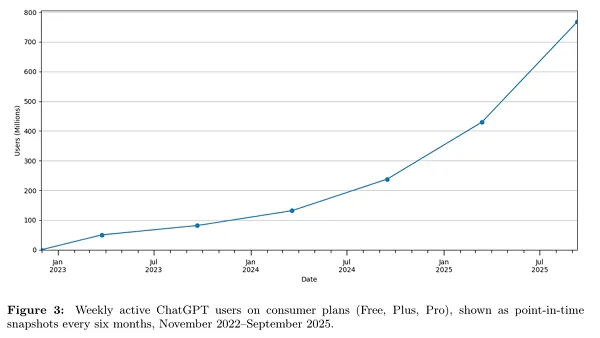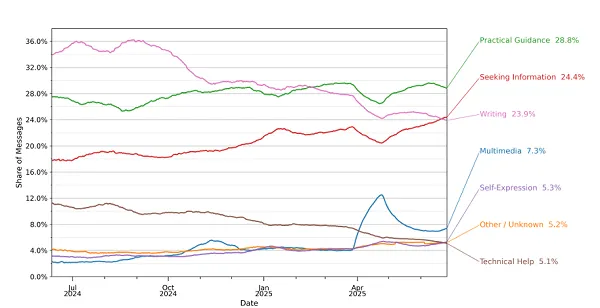OpenAI Unveils How the World Really Uses ChatGPT
 Adshine.pro09/16/20256 views
Adshine.pro09/16/20256 viewsOpenAI has released a new analysis of how people are using ChatGPT, charting the evolution of its conversational AI tool over time, and offering fresh insight into user behavior and broader technological trends.
The study draws on a sample of 1.5 million conversations across the past three years, providing a substantial dataset from which to identify shifts in usage patterns.
You can access the full report directly, but here are the highlights.
First, the report tracks ChatGPT’s explosive growth. From just one million active users in late 2022, the tool has expanded to a staggering 700 million weekly active users today.

That trajectory will surprise few observers, given how quickly ChatGPT has become shorthand for generative AI, fueling mass adoption and unprecedented public engagement with artificial intelligence.
The data also highlights the balance of personal versus professional use. According to OpenAI, 70% of conversations are not work-related, though both categories are growing steadily.
As the report notes:
“The three most common Conversation Topics are Practical Guidance, Seeking Information, and Writing, collectively accounting for about 77% of all ChatGPT conversations. Practical Guidance has remained constant at roughly 29% of overall usage. Writing has declined from 36% of all usage in July 2024 to 24% a year later. Seeking Information has grown from 14% to 24% of all usage over the same period.”

“Practical Guidance” refers to how-to advice, tutoring and teaching, while “Seeking Information” covers queries such as product details, recipes, and factual searches.
The shifts are notable. ChatGPT is increasingly being used as a discovery and decision-making tool—an alternative to traditional search engines like Google.
The study also categorizes interactions by purpose:
- - Asking – Requests for information to aid decision-making
- - Doing – Task execution, such as drafting emails or writing code
- - Expressing – Conversations that are neither asking nor doing, often reflective or personal in nature
The findings suggest that “Doing” tasks—essentially outsourcing work—are declining, while “Asking,” or information-seeking, has become the dominant form of engagement.
That raises important questions about the role AI will play in shaping how people think, search, and form judgments. If fewer users are relying on ChatGPT for writing and productivity tasks, but more are turning to it for guidance and information, what impact could this have on critical thinking and the way opinions are formed?
The numbers reveal fascinating dynamics around how humans are integrating AI into daily life—and hint at the longer-term cultural and cognitive implications of this shift.
📢 If you're interested in Facebook Ads Account, don't hesitate to connect with us!
🔹 https://linktr.ee/Adshinepro
💬 We're always ready to assist you!